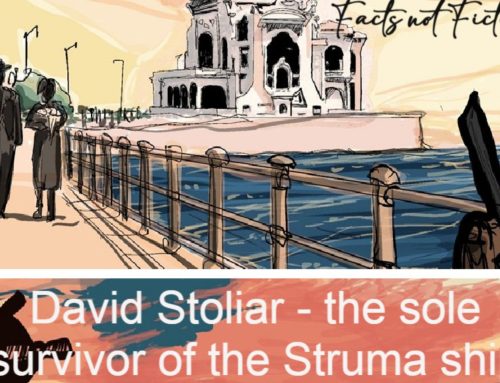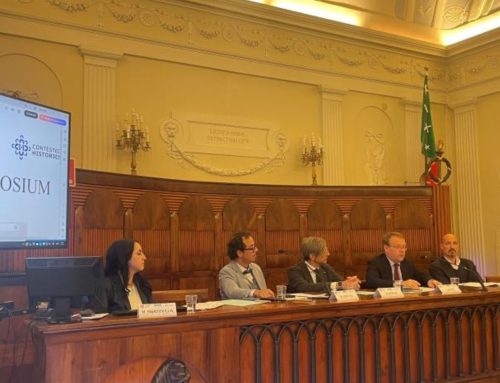New national pilot in The Netherlands explores the digitisation of the judicial archive of the post-war persecution of collaborators.
On Friday 13th September over 100 Dutch archivists, historians and other researchers gathered in Amsterdam at the Trippenhuis, seat of the Royal Academy of Science for a very interesting conference “Connect the Dots”. EuroClio asked me to attend as an Ambassador, in particular to see which relevance the content may have for education. Well, in short, not much. Not yet, at least. I did however take plenty of notes and am happy to share these with you if you have a further interest. In this report I’ll illustrate some of the fundamental issues which were presented and debated during a very interesting day.
What is it all about?
The TRIADO project essentially seeks to make one very specific archive more accessible. The Centraal Archief Bijzondere Rechtspleging is the archive of the post-war legal instrument employed to persecute Dutch collaborators and war criminals who supported the Nazi occupation, volunteered in the Nazi war machine, ‘hunted’ the Jews and cracked down on the anti-occupation resistance. This archive of over 14 kilometers of jurisprudence and legal documentation is available at the National Archives, but only by researchers and historians who apply and obtain special approval to see them. In 2025 this legal restriction will expire.
- Short series of interviews about the project can be viewed here (Dutch)
- Detailed technical implementation report here (English)
Essentially, the TRIADO project, is a pilot to see what possibilities exist to digitise this special archive and make it more accessible. Big questions arise from this opportunity:
- Should a digital archive which is that sensitive be available online?
- What about privacy and information of individuals?
- How can members of the public, if they are given more access, be supported in responsibly interpreting this archive?
Generally, the meeting was illustrative on a wide variety of challenges and opportunities of The Netherlands Dealing with the Past of collaboration and persecution in the process of the digitisation and the opening up of the special Tribunal archives.
What were some of the interesting issues?
A National 5-Year Documentary
To mark and document this process, the Dutch National Broascaster NOS has dedicated reporter Mr Lex Runderkamp, to follow the developments of this process between 2020 and 2025. As a war correspondent, most recently in Syria, he had always asked himself if he had done enough to raise awareness in the world on the importance of not looking away from crimes against humanity and genocide. A notion he illustrated with the post-war expression in the Netherlands “we did not know”. I found it quite special that the Dutch broadcaster has engaged in a project of five years to see where this will lead to. In particular in 2019-2020, we can see a lot of special attention given to the 75 years anniversary of the end of World War Two. This project puts a focus on war crime, strife and collaboration which is otherwise missing in the public eye.
Fear of the Data
Researchers during this day expressed a general excitement that this archive would be become searchable digitally on full-text level, and were somewhat taken by the presented prototypes which also stimulate them to ask new questions about the nature of collaboration in The Netherlands, for example about average age, types of families, environmental factors, and much more. But eminent sociologist Abram De Swaan expressed his concerns regarding the promise of Big Data in historical and sociological research. One example which he gave was that even if we would have all the wartime diaries digitised, the essential controversy about the big questions (did the citizens know of the Nazi regime horrors? Did they willingly participate, or could they have done more to resist, etc.), would have still been the same. He also pointed to various forms of bias in the sources which are obtained in the process of a trial, where actors act out of social desirability.
Privacy, Memory and History
The current archive is said to be the most consulted physical archive in the country. Ancestors are looking for very personal answers. Who betrayed my grandmother? What crimes was my uncle responsible for? Because of this, the archive carries large emotional loads. During the conference matters around anonymity came up a lot. At the same time a creeping desire to ‘get over it’ and ensure youth today are able to learn from this collection and part of history emerged. It seems to me that this archive tiptoes along the thin line that divides memory and history. Enabling full-text access to his, at the same time, including the opportunities for linked data, was recognised during the conversations as a big risk. One can only imagine a linked open data sort of ‘collaboration heat map’, or worse.
Digital humanities, Design and Diction
The project is coordinated by a network organisation called Netwerk Oorlogsbronnen, which in itself seeks to connect the worlds of research, heritage and technology. A particular presentation about the technical development of this pilot by the Director of the Royal Academy of Science Humanities cluster showed in great details the levels normally not considered by users of technological innovations. It was also very interesting to hear the important European and international infrastructures in digital humanities (such as Clariah, Clarin, Dariah, Cessda, Time Machine, Europeana, Dbpedia and more),on which such a pilot can flourish. It amazed me how much of our language in such projects has become tuned to technological design and development tongue, and can only hope researchers benefit from such projects and the cross-disciplinary learning it offers.
So?
Ultimately, this day took existing questions into a new arena. Researchers affirmed that critical source analysis is important, especially with such a sensitive and somewhat chaotic and technical archive as the War Tribunals one. The desire to provide better service to the “history-hungry” public is worth-while, but each steps should be considered very carefully. The issue of privacy kept coming back. The digital age and the long life of content online presents a special risk in the context of living memories of war which spark emotions of sadness and shame. I will seek to keep following this process over the coming years as well, and one particular issue remained open: what about education?
Jonathan Even Zohar-Zohar (Evenzo Consultancy) is the former Executive Director of EuroClio. He continues to represent EuroClio as an Ambassador.
Photo credits: Zoeken door CABR-dossiers | Fotoalbum ‘Centraal Archievendepot Justitie’ | Archief Ministerie van Justitie












